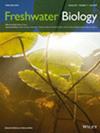螯虾群落在海狸池塘元群落的演替过程中趋于一致
IF 2.8
2区 生物学
Q2 ECOLOGY
引用次数: 0
摘要
元群落理论预测,群落结构的区域和局部过程的相对重要性将随着生态演替而变化。在不同演替阶段的淡水生境中,确定这些过程对空间结构的分类和进化多样性的影响,可大大提高对跨时空尺度多样性维持的理解。在这项研究中,我们评估了因海狸(Castor canadensis)干扰而发生二次演替的池塘元群落在局部和区域尺度上的螯虾多样性。根据元群落生态学的理论预测,随着演替的进行,局部过程的重要性不断增加,我们假设随着演替的进行,螯虾的局部和β多样性会随着局部结构的加强而下降,因为老池塘提供的合适栖息地可能不如溪流。我们对位于三个集水区的海狸鼠池塘元群落和参考源头溪流中的螯虾物种和系统发育多样性进行了评估。线粒体细胞色素氧化酶 I 基因的 DNA 序列被用来为群落和系统发育多样性测试分配螯虾物种。在年龄从 24 年到 70 年不等的海狸池塘中,对本地多样性和 β 多样性进行了对比,并将其作为元群落过程的函数。与预测相反,溪流和池塘演替阶段(24-39 年;42-57 年;60-70 年)的局部物种多样性没有差异,但在最古老的池塘生态系统中出现了群落和系统发育趋同。最年轻池塘和最古老池塘的螯虾群落组成不同,这是因为最年轻池塘的螯虾丰度较高,而最古老池塘的螯虾群落趋同。在溪流中,群落组成与环境的关联性最强,并且与池塘年龄脱钩。相比之下,种内单倍型组成与环境的相关性随着演替而增加。在三个元群落中,区域性小龙虾物种多样性是由海狸鼠构建的生态系统的时间和环境驱动因素以及集水区内的扩散限制共同造成的。这项研究是对海狸鼠池塘元群落演替阶段的分类和系统发育多样性响应的首次调查。根据池塘年龄检测到不同的小龙虾组成和单倍型分类,这表明了当地结构的作用,并进一步表明未来的研究应承认演替在塑造当地和区域范围的物种多样性方面的作用。集水区内的传播限制可能有助于元群落中小龙虾物种多样性的演化和生物多样性的整体维持。这些结果支持了群落和淡水生态学从近期强调空间过程向整合时间驱动因素的转变,以更好地确定跨尺度分类和系统发育多样性的调节因素。本文章由计算机程序翻译,如有差异,请以英文原文为准。
Crayfish communities converge over succession in beaver pond metacommunities
求助全文
通过发布文献求助,成功后即可免费获取论文全文。
去求助
来源期刊

Freshwater Biology
生物-海洋与淡水生物学
CiteScore
5.90
自引率
3.70%
发文量
162
审稿时长
2 months
期刊介绍:
Freshwater Biology publishes papers on all aspects of the ecology of inland waters, including rivers and lakes, ground waters, flood plains and other freshwater wetlands. We include studies of micro-organisms, algae, macrophytes, invertebrates, fish and other vertebrates, as well as those concerning whole systems and related physical and chemical aspects of the environment, provided that they have clear biological relevance.
Studies may focus at any level in the ecological hierarchy from physiological ecology and animal behaviour, through population dynamics and evolutionary genetics, to community interactions, biogeography and ecosystem functioning. They may also be at any scale: from microhabitat to landscape, and continental to global. Preference is given to research, whether meta-analytical, experimental, theoretical or descriptive, highlighting causal (ecological) mechanisms from which clearly stated hypotheses are derived. Manuscripts with an experimental or conceptual flavour are particularly welcome, as are those or which integrate laboratory and field work, and studies from less well researched areas of the world. Priority is given to submissions that are likely to interest a wide range of readers.
We encourage submission of papers well grounded in ecological theory that deal with issues related to the conservation and management of inland waters. Papers interpreting fundamental research in a way that makes clear its applied, strategic or socio-economic relevance are also welcome.
Review articles (FRESHWATER BIOLOGY REVIEWS) and discussion papers (OPINION) are also invited: these enable authors to publish high-quality material outside the constraints of standard research papers.
 求助内容:
求助内容: 应助结果提醒方式:
应助结果提醒方式:


